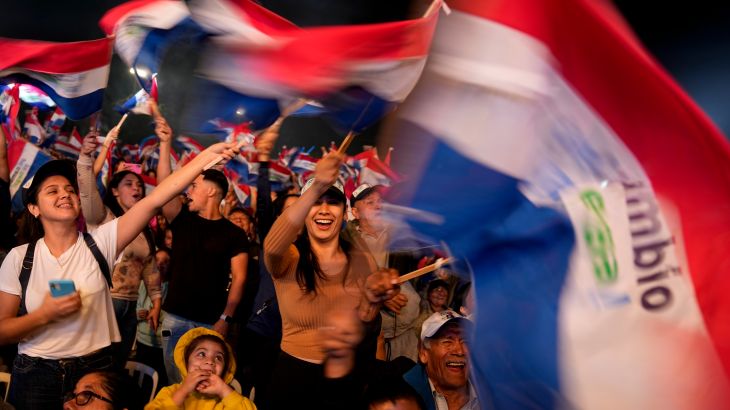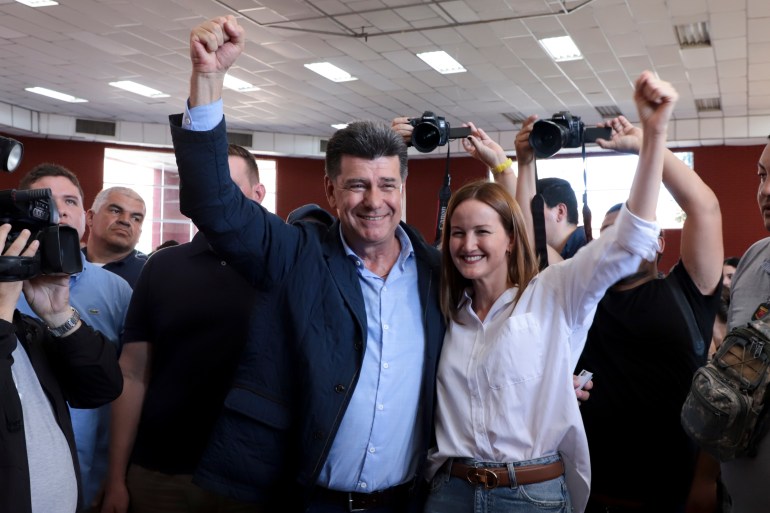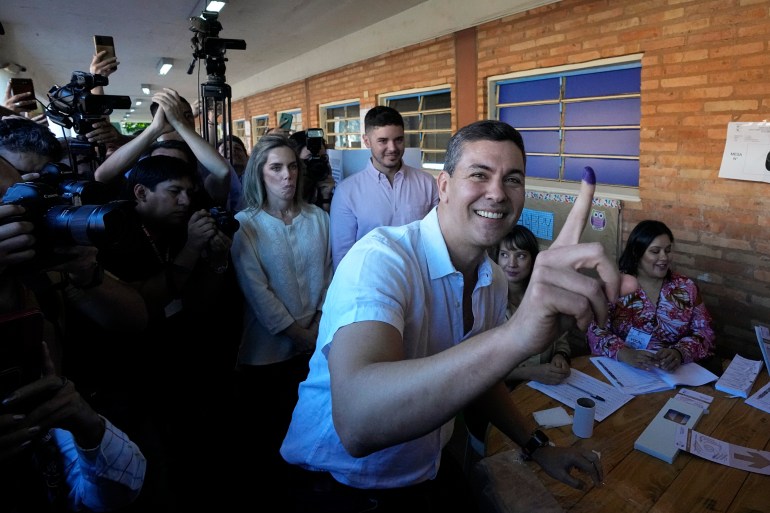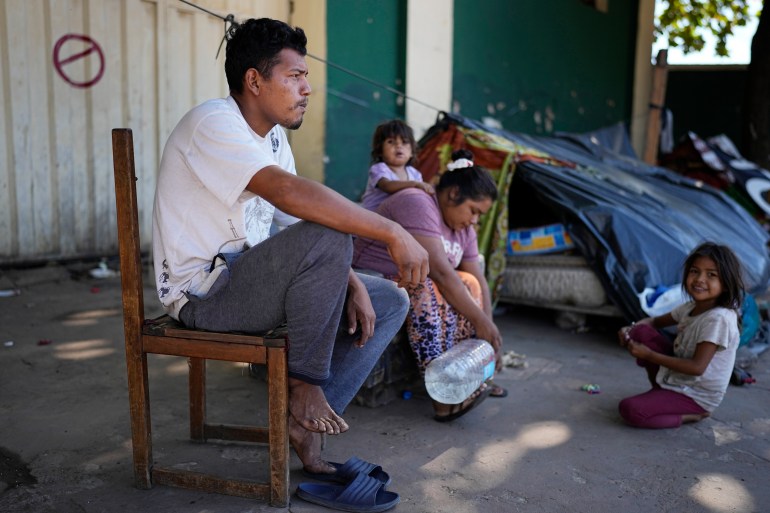Polls open in Paraguay elections, with Taiwan ties in the balance
Ruling Colorado Party’s Santiago Pena takes on political veteran Efrain Alegre in a winner-takes-all first-round presidential race.

Polling stations have opened across Paraguay as voters pick a president they hope will tackle endemic corruption, rising crime and economic inequality, with the election potentially impacting the country’s future ties with Taiwan.
A centre-left coalition is aiming to end the almost unbroken, seven-decade hegemony of the ruling conservative Colorado Party in the closest race in many years.
Keep reading
list of 3 itemsUS accuses top Paraguay politicians of corruption, spurring probe
Paraguay’s vice president to stay on after corruption accusations
Some 4.8 million of the South American country’s 7.5 million inhabitants are eligible to vote in the election for the president and legislature that will be determined in a single round on Sunday.
Lawyer Efrain Alegre, 60, of the Concertacion centre-left coalition, was leading narrowly in opinion polls before the vote amid a recent anti-incumbency trend in Latin American elections.
His main challenger is Santiago Pena, a 44-year-old economist and former finance minister hoping to continue the rule of the Colorado Party that has governed almost continually since 1947 – through a dictatorship and since the return of democracy in 1989.
Though they differ on economic and international policy, the two frontrunners are both socially conservative, defending strong anti-abortion and anti-gay marriage stances in an overwhelmingly Catholic nation.
As polls opened, Alegre and Pena urged Paraguayans to vote, a call echoed by outgoing President Mario Abdo Benitez, who is constitutionally limited to a single term.
“The higher the turnout, the greater the legitimacy of democracy,” Abdo said after being one of the first to cast a ballot in the capital Asuncion.

Foreign policy shake-up?
The outcome could have important consequences for Paraguay’s international relations. It is among only 13 countries to recognise Taipei over Beijing.
But Alegre has vowed to reconsider this if he wins.
“Relations with Taiwan mean the loss of one of the largest markets, which is China,” he told the AFP news agency.
“Paraguay makes a very big effort, a very big sacrifice to have relations with Taiwan, but we are not seeing from Taiwan the same effort,” he said.
Latin America has been a key diplomatic battleground.
China considers self-ruled, democratic Taiwan part of its territory to be retaken one day, and does not allow countries that maintain relations with China to recognise both Beijing and Taipei.
Nicaragua shifted its allegiance to Beijing in 2021, as did El Salvador in 2018, Panama in 2017 and Costa Rica in 2007.
Pena has said he would retain ties with Taiwan but move Paraguay’s embassy in Israel from Tel Aviv to Jerusalem.
Paraguay had previously moved its embassy in 2018, but reversed its decision within months.
“Yes, I would go back to Jerusalem,” Pena told AFP before the vote.

Corruption allegations
Alegre repeatedly pointed to corruption in the Colorado Party, which has seen two of its top members recently hit with US sanctions over alleged graft.
They include Pena’s political mentor and president of the Colorado Party, former President Horacio Cartes.
Paraguay is ranked 137 out of 180 countries on Transparency International’s Corruption Perceptions Index.
“We are going to defeat the Paraguayan Pablo Escobar and we are going to launch the real Paraguay – the Paraguay of hard work, of the family, of patriotism. That’s our Paraguay,” Alegre told Al Jazeera from a rally.
When asked about the Paraguayan equivalent of Colombian drug lord Escobar, Alegre responded: “Cartes, he is the Pablo Escobar of Paraguay and his hand-picked candidate, Santiago Pena is ‘El Chili’, Escobar’s right-hand man,” Alegre said.
Al Jazeera’s Lucia Newman, reporting from the capital of Asuncion, said that after two failed attempts to run for president, “Alegre seems confident he will be third-time lucky. His campaign slogan is, ‘a choice between the mafia or the nation.’”
“Cartes is one of Paraguay’s wealthiest and most powerful men, who was sanctioned by the US in January for ‘rampant corruption that undermines democratic institutions’ and alleged ties to drug trafficking and Hezbollah,” Newman said.
Pena told Al Jazeera that his mentor Cartes, who denies the charges of corruption, has the right to defend himself and also insisted that he is his own man.
“Nobody can claim that I am not prepared to be president, no one can claim that I do not have the expertise in public policy, and nobody can point to myself [and say] that I have any case of corruption during my services in public administration,” Pena said.

‘Not interested’
Apart from the shadow of top-level graft, which has angered voters, other election issues include poverty, social inequality and an escalating crime problem.
Paraguay’s gross domestic product is expected to grow 4.8 percent in 2023, according to the central bank, and 4.5 percent according to the International Monetary Fund – one of the highest rates in Latin America.
But poverty plagues about a quarter of the population.
“The country is full of privileged people. People earn 100 million guaranis (about $14,000) a month while others are dying of hunger,” Alegre said.
Paraguay’s Indigenous groups, and inhabitants of informal settlements, feel especially neglected.
“I am not interested. We’re not going to vote,” said Albino Cubas, who has shared a ramshackle wooden hut with his wife and three children in the capital’s Tacumbu slum since a flood took their home.
“I have not seen a serious proposal for the poor,” he told AFP.
In addition to the presidency, voters are deciding the members of the legislature and choosing 17 governors.